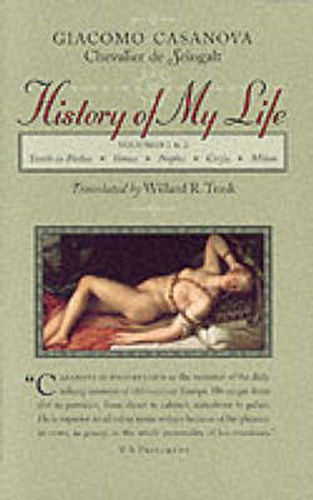Readings Newsletter
Become a Readings Member to make your shopping experience even easier.
Sign in or sign up for free!
You’re not far away from qualifying for FREE standard shipping within Australia
You’ve qualified for FREE standard shipping within Australia
The cart is loading…






Giacomo Casanova was born in Venice in 1725. His parents, both actors, wanted him to become a priest, but their hopes were dashed when, at sixteen, he was expelled from the seminary for immoral misconduct. Probably best-known for his reputation as a womanizer, Casanova was in turn a secretary, a soldier in the Venetian army, a preacher, an alchemist, a gambler, a violinist, a lottery director, and a spy. He translated Homer’s Iliad into Italian and collaborated with Da Ponte on the libretto for Mozart’s Don Giovanni. He retired in 1785 to the castle of a friend - Count Waldstein of Bohemia - in order to write his memoirs. Because every previous edition of Casonova’s Memoirs had been abridged to suppress the author’s political and religious views and tame his vivid, often racy, style, the literary world considered it a major event when Willard R. Trask’s translation of the complete original text was published in six double volumes between 1966 and 1971. Trask’s award-winning translation now appears in paperback for the first time.
$9.00 standard shipping within Australia
FREE standard shipping within Australia for orders over $100.00
Express & International shipping calculated at checkout
Giacomo Casanova was born in Venice in 1725. His parents, both actors, wanted him to become a priest, but their hopes were dashed when, at sixteen, he was expelled from the seminary for immoral misconduct. Probably best-known for his reputation as a womanizer, Casanova was in turn a secretary, a soldier in the Venetian army, a preacher, an alchemist, a gambler, a violinist, a lottery director, and a spy. He translated Homer’s Iliad into Italian and collaborated with Da Ponte on the libretto for Mozart’s Don Giovanni. He retired in 1785 to the castle of a friend - Count Waldstein of Bohemia - in order to write his memoirs. Because every previous edition of Casonova’s Memoirs had been abridged to suppress the author’s political and religious views and tame his vivid, often racy, style, the literary world considered it a major event when Willard R. Trask’s translation of the complete original text was published in six double volumes between 1966 and 1971. Trask’s award-winning translation now appears in paperback for the first time.